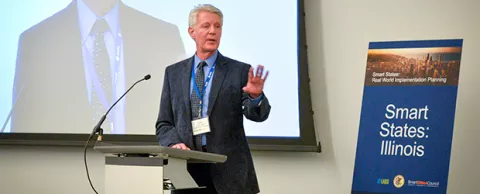
It was easy for Illinois to end up in its current situation. Ending up with one of the worst technology platforms of any state didn’t require any effort at all.
But even if you’re 40 years behind the times, you shouldn’t give up. Illinois has decided not to play catch-up. It’s using this as an opportunity to leapfrog others and is on its way to becoming the first smart state.
At the first Smart States event, Illinois brought together state department heads and leaders of cities large, mid-size and small. The two-day event ended with inspired leaders, rough plans, long to-do lists and hope for a better tomorrow. Even if you’re in last place, you have the power to improve. But if you don’t take that step, others will raid you for the jobs and prosperity you have left. — Jesse Berst
This is how much technology matters
If you don’t think technology makes a difference, talk to the governor of Illinois, a state that is still relying on software that was completed in 1974, the year he graduated.
“We have been on a track that has pushed many employers out of the state,” Governor Bruce Rauner told the audience at the Smarter States event in Chicago. “We have fewer jobs than we had 17 years ago. We lost the confidence of many job creators. We lost the confidence of many homeowners. It is incumbent on us to change the course.”
The state is now on its way to becoming America’s first “smart state.” And it is not only making up for its 42-year technology deficit, but leaping past states that are actually considered modern.
Hardik Bhatt, the state’s secretary for the Department of Innovation and Technology, notes the dire spot it’s starting from. It spends more on technology than all but two other states, yet it’s near the bottom for getting results from it.
“The losing entity is the taxpayer,” Bhatt said.
Taking the first steps
Illinois has already held nearly 200 Kaizen events with staff to find opportunities to improve. Those events have made processes more efficient, typically cutting them in half.
It’s also chalking up some early wins. One of which is the state’s corrections department. It jumped from an ancient mainframe system to cloud computing in December. That switch comes with advanced analytics, allowing the department to customize the re-entry plan for each offender, raising the chances they will be able to successfully reintegrate into society.
Plotting a smart future
Often, taking the first step to a smarter future begins by bringing the right people together, letting them help set the course of action and be responsible for taking the steps.
At the Smart States event, Illinois talked about what they can do to prepare for connected and autonomous vehicles, which are coming, whether the state is ready for them or not. This also involves giving travelers access to more and better real-time information, not only telling them how long it will take to get to their destination, but which route is the fastest and which lanes are closed.
Getting the right information from the public was a key topic too. While millennials have no problem sharing personal information, others aren’t so forthcoming. Participants in the event talked about incentives the state could provide to make citizens more willing to share — vital for mileage-based tolling or other initiatives to work.
Others, including leaders of several small- and mid-size cities talked about approaches that they could take to make their energy networks more resilient. They explored how microgrids could make the network more secure by diversifying it and talked about how they could illustrate the benefit to taxpayers.
Levers for acceleration
The initial priorities and approaches in Illinois aren’t right for everyone, but progress is made when leaders meet and are inspired to take action.
“The 40-year journey doesn’t happen in 4 years if you don’t find levers for acceleration,” Bhatt said.
More stories …
Five keys to delivering the city (or state) your citizens want
Why and how Illinois is racing to become a Smart State



